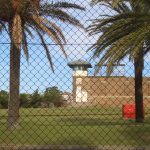Woman Who Hatched Helicopter Prison Escape Appeals

John Reginald Killick was being held on remand at Silverwater gaol in March 1999. He was awaiting sentencing after having pled guilty to two counts of armed robbery, as well as one charge of shooting at an off-duty police officer.
On the morning of 25 March, Killick’s partner of three years, Lucy Dudko arrived at the office of Helicopters Pty Ltd at Bankstown Airport to take a Harbour Bridge Track tour, which included flying by the Olympic Stadium.
Timothy Joyce was the pilot of the Bell 47 helicopter that Ms Dudko hired. As the chopper got closer to the stadium, she requested that Mr Joyce fly towards Silverwater gaol. The pilot refused, so Dudko pulled a pistol out of her purse, put it to his head and said, “This is a hijack.”
The armed passenger ordered Joyce to land on an oval in the maximum security correctional facility. Mr Killick then boarded the helicopter. Dudko handed the inmate an automatic weapon she’d just assembled, which he pointed at prison guards as they started firing in the direction of the chopper.
Using a street directory, Ms Dudko directed the pilot towards Macquarie University and told him to land on a playing field. After tying Mr Joyce up, Dudko and Killick then jumped into the car of a stranger, Mr Peter Bax, and forced him to drive them to North Sydney.
The pair were on the run from police for 45 days. They were eventually arrested in a cabin at the Bass Hill Tourist Park. Officers found two pistols in their room, one was of the Derringer style and the other was in the style of a Luger.
Throwing the book at her
Ms Dudko’s trial before a jury began in the NSW District Court in March 2001. The defendant appeared on five charges.
The first charge was for one count of rescue an inmate in lawful custody by force, contrary to section 32 of the now repealed Correctional Services Act 1952. Today, this offence is contained under section 310B in the Crimes Act 1900.
The maximum penalty for this offence was, and still is, 14 years behind bars.
The second charge was for one count of assaulting a member of the crew of an aircraft, under section 206(a) of the Crimes Act. This offence carries a maximum penalty of 14 years imprisonment.
In relation to the carjacking, Ms Dudko was charged with one count of detain for advantage, contrary to now repealed section 90A of the Crimes Act. This offence also carried a maximum penalty of 14 years in gaol.
Section 90A was revoked in 2001.These days, an individual is charged with detain for advantage under section 86 of the Crimes Act, which provides for three levels of kidnapping offences: basic, aggravated and specially aggravated.
And the final charges were for two counts of the unauthorised possession of a firearm, under section 7(1) of the Firearms Act 1996. If an individual was convicted of this crime in 2001 the maximum penalty was 10 years gaol time, but nowadays, an offender is liable to up to 14 years on the inside.
Mistaken identity
During the trial, Ms Dudko claimed it wasn’t her who pulled off the prison break. She said it was the work of a professional hijacker. She explained that she met up with Mr Killick after he’d broken out of prison and that she’d only helped him with a few minor details.
But, the jury didn’t buy it. They found Ms Dudko guilty on all counts.
On 20 July 2001, NSW District Court Judge Helen Morgan imposed two 10 year prison sentences, with non-parole periods of 7 years, for the forceful rescue of an inmate, as well as the charge of assaulting a crew member.
Her Honour handed down a 5 year fixed term for the kidnapping offence and a fixed term of 3 years each for both of the firearm crimes. The sentences were all to be served concurrently, which meant Dudko was facing at least 7 years inside, with the possibility of an extra 3 years.
Appealing her convictions
Ms Dudko appealed against her convictions and her sentences to the NSW Court of Criminal Appeal (NSWCCA) in June 2002. In his full findings published on 20 August, then NSW Chief Justice James Spigelman dismissed each of her 14 grounds of appeal against her convictions, one after the other.
In regard to the rescue of a prisoner, the hijacking and the detain for advantage charges, Dudko argued that the intense pre-trial media coverage created a prejudice against her in at least some of the minds of the jurors, which led to a miscarriage of justice.
His Honour said that there had been a significant amount of publicity, although, most of it was two years prior to the case. And he pointed to a substantial body of judicial statements that show jurors do differentiate between the evidence and what they may have heard before a trial.
The Chief Justice also said that the trial judge had given “clear and forceful direction to the jury” regarding returning a verdict in accordance with the evidence. And in light of these directions, Justice Spigelman found that Ms Dudko “was not denied a fair trial.”
Ms Dudko also argued that there was no evidence that she had any knowledge of the existence of the firearms. However, his Honour found that as the jury accepted that she was the hijacker, this reinforced the conclusion that she was in possession of the weapons.
Punished twice
On appealing her sentence, Ms Dudko argued that she’d been given double punishment in relation to the rescuing of an inmate using force and the assault of a crew member, as both offences involved the same act.
But, the Chief Justice found that even though the force and the threat were constituted by the same act, the “gist” of the criminal behaviour was not the same for the two offences. “In my opinion, it is not correct to say that there was a double punishment on the facts of this case,” his Honour said.
“This court should not interfere”
And finally, Ms Dudko’s legal team put forth that the sentence was manifestly excessive. But, his Honour found that “the level of violence implicit in the threat against the helicopter pilot” justified a 10 year head sentence.
Chief Justice Spigelman ruled that “the appeal should be dismissed.” NSWCCA Justice Carolyn Simpson and Acting Justice Reg Blanch both agreed with his Honour.
Ms Dudko served her time at Mulawa Women’s Prison, which is located within the Silverwater Correctional Complex. She served 7 years gaol time, before being released on parole on 9 May 2006.








